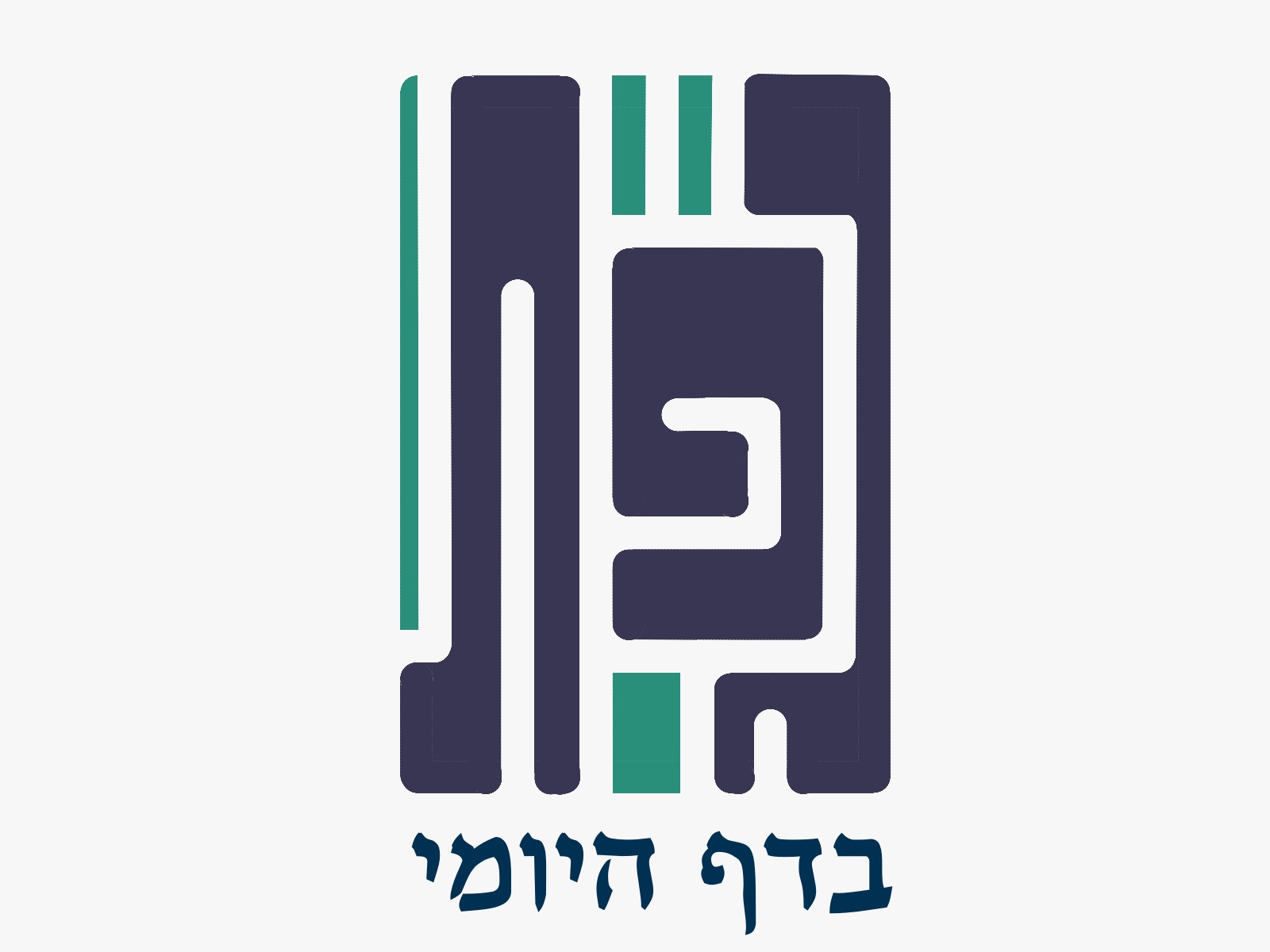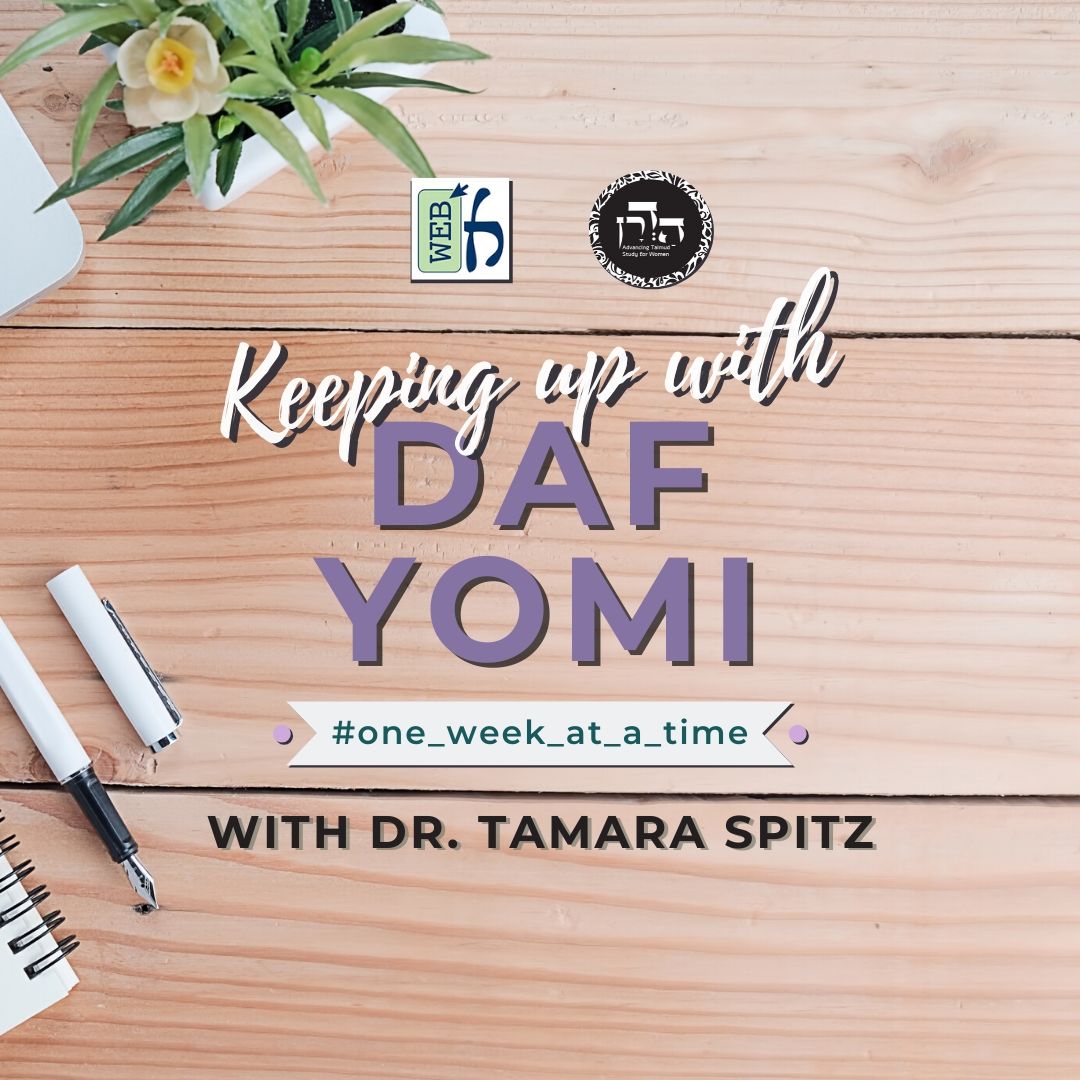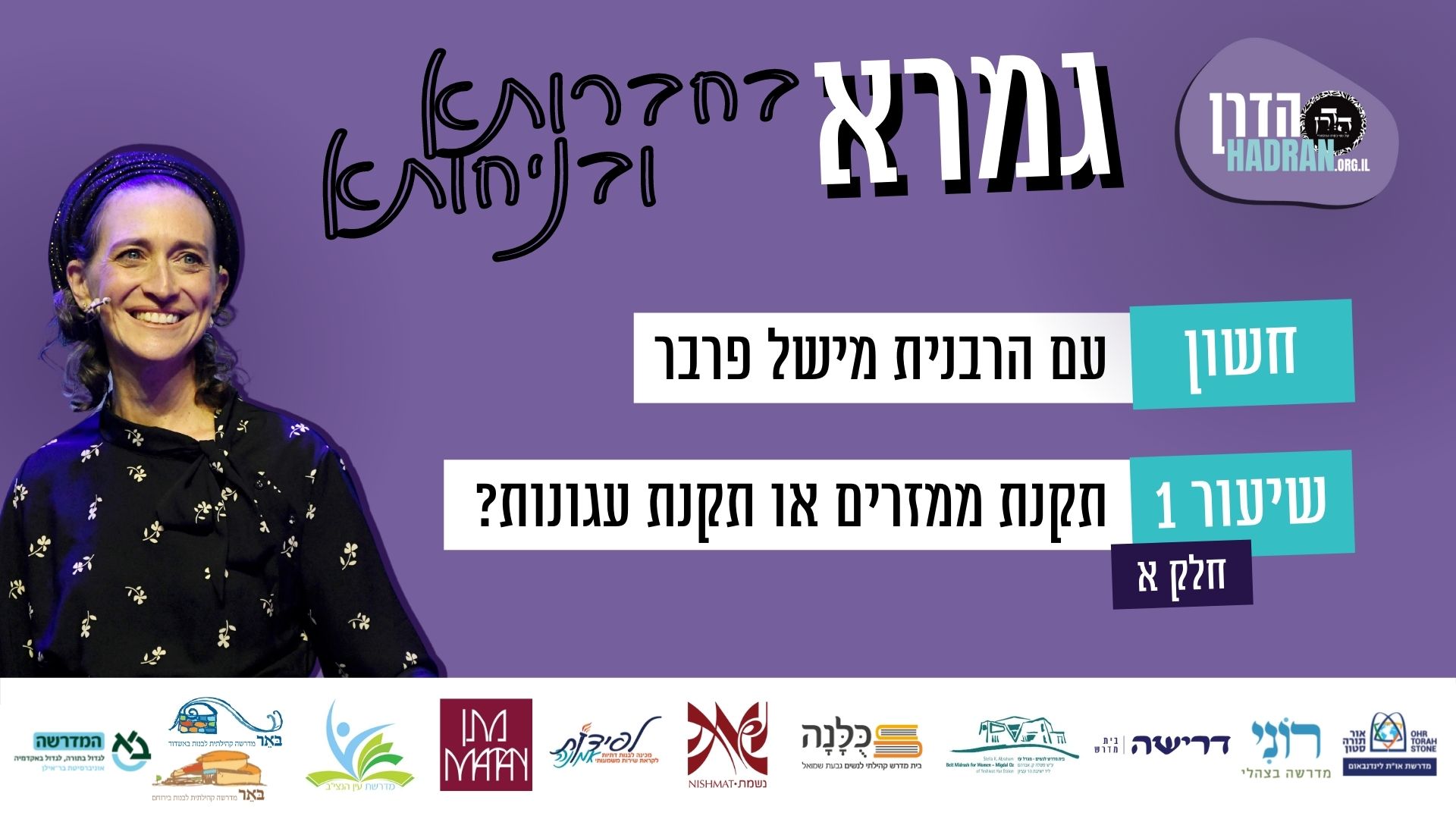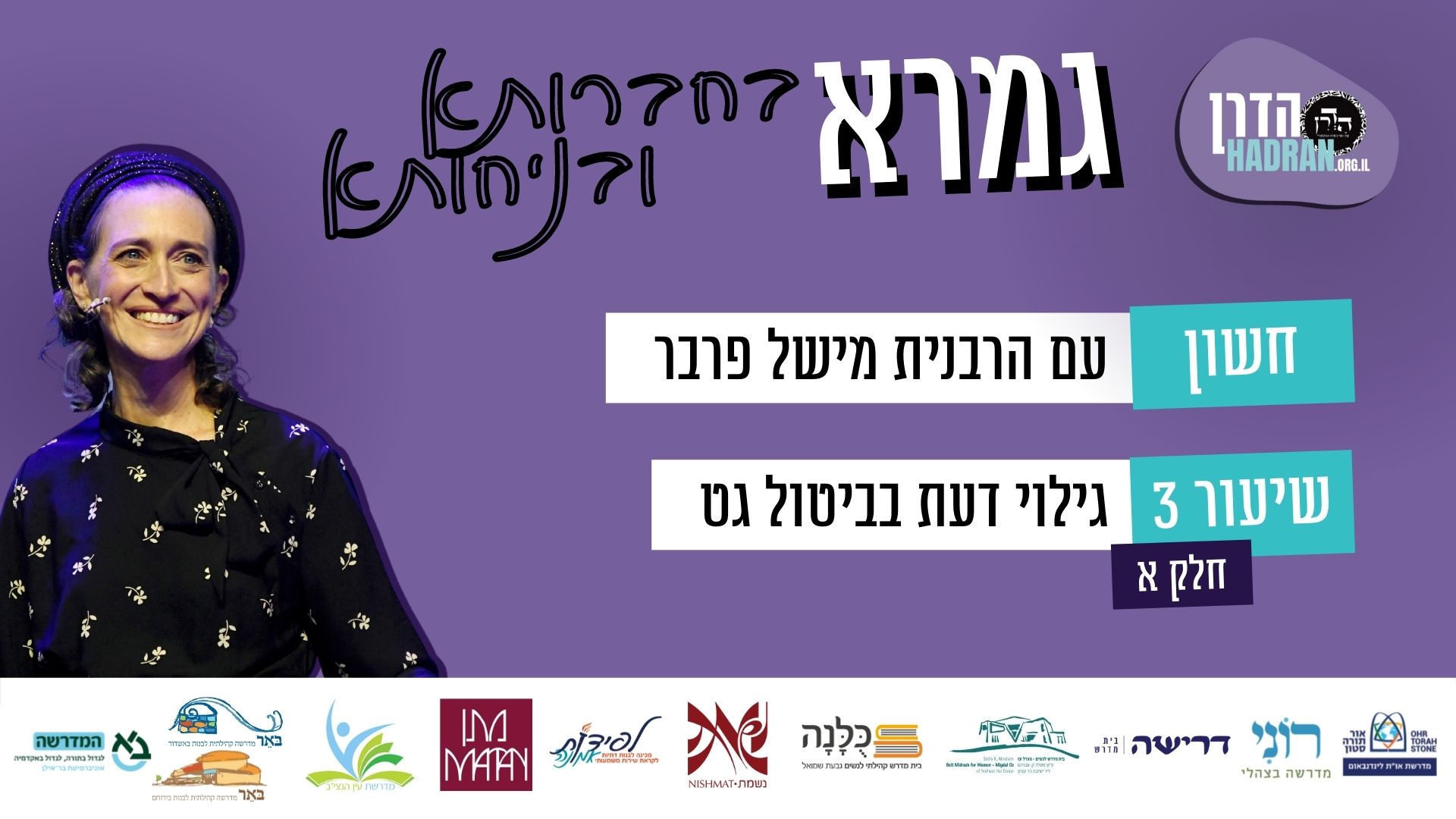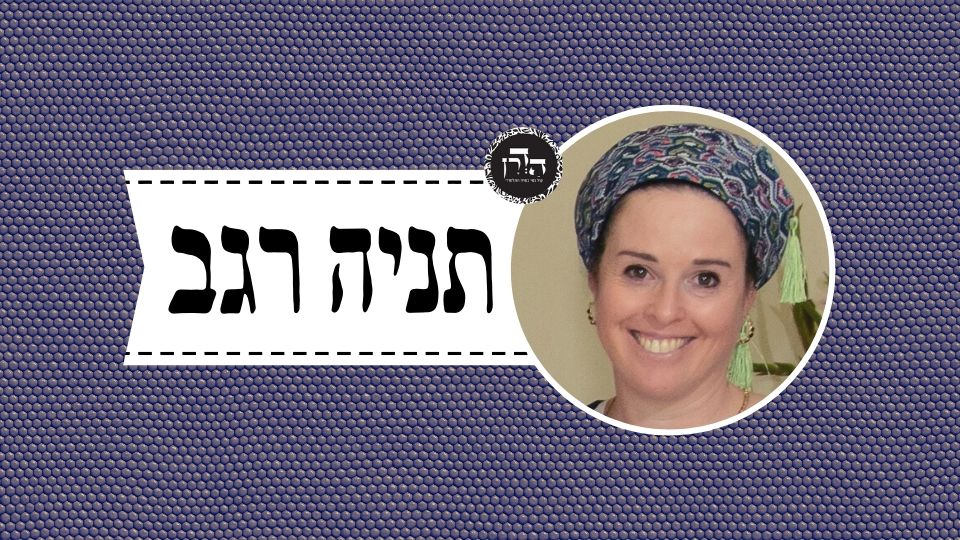מניין לנו שידות ושומרים מכניסים ומוציאים טומאה? ומניין ששומרים מצטרפים בטומאת אוכלים ולא בנבילה?
הלימוד השבוע מוקדש לזכות ולשלום הַיְימׇנוֹט אֱמוּנָה בַּת באנצ’י (קָסָאוּ) בת 11 שנעלמה במקום מגוריה בצפת, לפני שנתיים, ביום ט”ז אדר תשפ”ד (25.2.24), ולא נודעו עקבותיה.
הלימוד השבוע מוקדש למען ביטחון המדינה, החיילים והאזרחים, ולמען חירותו של העם האיראני. שנזכה בקרוב שיתקיים בנו הפסוק: "לַיְּהוּדִים הָיְתָה אוֹרָה וְשִׂמְחָה וְשָׂשֹׂן וִיקָר”.
רוצה להקדיש שיעור?

כלים
הלימוד השבוע מוקדש לזכות ולשלום הַיְימׇנוֹט אֱמוּנָה בַּת באנצ’י (קָסָאוּ) בת 11 שנעלמה במקום מגוריה בצפת, לפני שנתיים, ביום ט”ז אדר תשפ”ד (25.2.24), ולא נודעו עקבותיה.
הלימוד השבוע מוקדש למען ביטחון המדינה, החיילים והאזרחים, ולמען חירותו של העם האיראני. שנזכה בקרוב שיתקיים בנו הפסוק: "לַיְּהוּדִים הָיְתָה אוֹרָה וְשִׂמְחָה וְשָׂשֹׂן וִיקָר”.
כלים
העמקה
רוצה להבין מה באמת קורה מתחת לפני השטח של הסוגיה?
שיעורים, פודקאסטים והרחבות של מיטב המורות שלנו יפתחו לך עוד זוויות וכיווני חשיבה.
חדשה בלימוד הגמרא?
זה הדף הראשון שלך? איזו התרגשות עצומה! יש לנו בדיוק את התכנים והכלים שיעזרו לך לעשות את הצעדים הראשונים ללמידה בקצב וברמה שלך, כך תוכלי להרגיש בנוח גם בתוך הסוגיות המורכבות ומאתגרות.
פסיפס הלומדות שלנו
גלי את קהילת הלומדות שלנו, מגוון נשים, רקעים וסיפורים. כולן חלק מתנועה ומסע מרגש ועוצמתי.
חולין קיח
יכול הנוגע כנגד בשר מאחוריו לא יהא טמא תלמוד לומר (ויקרא יא, כד) יטמא
One might have thought that only one who touches the flesh of the carcass becomes impure, but one who touches the external side of the hide of the carcass that is aligned with the flesh, but does not touch the flesh itself, does not become impure. Therefore, the verse states: “One who touches its carcass shall be impure until the evening” (Leviticus 11:39). It is derived from the term “shall be impure” that even one who touches the hide in this manner becomes impure.
מאי קאמר אמר רבא ואמרי לה כדי חסורי מיחסרא והכי קתני בנבלתה ולא בעור שאין עליו כזית בשר ועור משלימו לכזית
The Gemara asks: What is the baraita saying? The first clause of the baraita teaches that the hide does not impart impurity of a carcass while the latter clause teaches that one who touches the hide does become impure with the impurity of a carcass. Rava said, and some say it unattributed: The baraita is incomplete and this is what it is teaching: The term “its carcass” teaches that one who touches the flesh of a carcass becomes impure but one who touches the hide of a carcass upon which there is not an olive-bulk of flesh does not become impure. And even if the volume of the hide together with the flesh adds up to an olive-bulk, the hide does not join together with the flesh to constitute the measure of an olive-bulk required to impart impurity of an animal carcass.
יכול שאני מוציא אף עור שיש עליו כזית בשר הנוגע כנגד בשר מאחוריו יכול לא יהא טמא ואפילו מעשה יד נמי לא עביד
One might have thought that I remove from the category of impurity of a carcass even a hide upon which there is an olive-bulk of flesh with regard to one who touches the external side of the hide of the carcass that is aligned with the flesh but does not touch the flesh itself. One might have thought that he does not become impure in such a case, and that the hide in this case does not even constitute a handle of the flesh, which would render one who touches it impure as though he touched the flesh itself.
תלמוד לומר יטמא
Therefore, the verse states: “Shall be impure,” from which it is derived that even though an appendage that serves as protection for the flesh does not join together with the flesh to constitute the measure of an olive-bulk required to impart the impurity of animal carcasses, it is considered a handle of the flesh, which does impart impurity. Therefore, if there is an olive-bulk of flesh attached to the hide, one who touches the outside of the hide becomes impure, even if he did not touch the flesh.
תנן התם כל שהוא יד ולא שומר טמא ומטמא ואינו מצטרף
§The Gemara discusses the transmission of impurity of food with regard to accessories that serve as a handle and that provide protection. We learned in a mishna there (Okatzin 1:1): With regard to any appendage that serves as a handle, i.e., a part that one holds while eating the food, but does not provide protection, the attached food becomes impure if the handle comes into contact with a source of impurity, and the handle transmits impurity from the attached food to other foods that come into contact with the handle. But the handle does not join together with the food to constitute the requisite measure to impart impurity.
שומר ואע”פ שאינו יד טמא ומטמא ומצטרף לא יד ולא שומר לא טמא ולא מטמא
With regard to any appendage that provides protection, even if it does not serve as a handle, the attached food becomes impure if the protection comes into contact with an impure item, and the protection imparts impurity, and it also joins together with the food to constitute the requisite measure to impart impurity. With regard to an appendage that does not serve as a handle nor as protection, the attached food does not become impure if the appendage comes into contact with a source of impurity, nor does the appendage impart impurity. In addition, it does not join together with the food to constitute the requisite measure to impart impurity.
ידות היכא כתיבי דכתיב (ויקרא יא, לח) וכי יותן מים על זרע ונפל מנבלתם עליו טמא הוא לכם לכם לכל שבצרכיכם לרבות את הידות
The Gemara asks: Where is this halakha that handles are susceptible to and impart impurity written? The Gemara answers: As it is written with regard to the impurity of food: “But if water is put on the seed, and any of the carcass falls on it, it is impure for you” (Leviticus 11:38). It is derived from the term “for you” that any part needed for your use of the food is susceptible to impurity and imparts impurity, including the handles that facilitate the consumption of the food.
וכתיב (ויקרא יא, לט) וכי ימות מן הבהמה אשר היא לכם לכם לכל שבצרכיכם לרבות את הידות יד להכניס ולהוציא
And furthermore it is written with regard to the impurity of a carcass: “And if any animal which is for you to consume dies, one who touches its carcass shall be impure until the evening” (Leviticus 11:39). The term “for you” indicates that any part needed for your use of the carcass imparts impurity, including the handles. One who touches the handle of an item that is impure with impurity of a carcass becomes impure as though he touched the carcass itself. These two verses teach that a handle transmits impurity both with regard to importing impurity into the attached food and with regard to exporting impurity from the attached food.
שומר להכניס ולהוציא לא צריך קרא ק”ו מיד אתי ומה יד שאינה מגינה מכנסת ומוציאה שומר לא כ”ש
A verse is not needed to derive that protection both imports and exports impurity. This halakha is inferred a fortiori from the halakha of a handle: If a handle, which is treated more leniently than protection because it does not protect the food, nevertheless both imports and exports impurity, then with regard to protection, which is treated more stringently than a handle because it protects the food, should it not all the more so import and export impurity?
שומר דכתב רחמנא למה לי ש”מ לצרף
Since this is so, why do I need the verse that the Merciful One writes from which it is derived that protection is considered part of the food with regard to ritual impurity, i.e., the verses: “Upon any sowing seed that is sown…It is impure for you” (Leviticus 11:37–38)? Conclude from these verses that protection not only imparts impurity, but even joins together with the food to constitute the requisite measure to impart impurity.
ואימא יד להכניס ולא להוציא שומר להכניס ולהוציא אבל יד להוציא ושומר לצרף לא
The Gemara challenges: But say that these verses should be interpreted differently: A handle, which is treated more leniently than protection, is considered part of the food such that it imports but does not export impurity. Protection, which is treated more stringently than a handle, is considered like food to import and export impurity. But it is not derived that a handle exports impurity nor that protection joins together with the food to constitute the requisite measure to impart impurity.
יד להכניס ולא להוציא לא מצית אמרת השתא עיולי מעיילא אפוקי מיבעיא
The Gemara explains: You cannot say that a handle is considered part of the food such that it imports but does not export impurity for the following reason: Now that the handle is considered part of the food with regard to importing impurity into the food, is it necessary to state that it exports impurity? If a handle can cause ritually pure food attached to it to become impure, certainly it can transmit the impurity of impure food attached to it to other foods. Consequently, since a handle both imports and exports impurity, it is inferred a fortiori that protection also imports and exports impurity. It is therefore derived from the verse concerning appendages that serve as protection that protection joins together with the food to constitute the requisite measure to impart impurity.
ואימא יד להוציא ולא להכניס שומר להוציא ולהכניס אבל יד להכניס ושומר לצרף לא
The Gemara challenges: But say instead that a handle, which is treated more leniently than protection, is considered part of the food such that it exports but does not import impurity. Protection, which is treated more stringently than a handle, both exports and imports impurity. But it is not derived that a handle imports impurity nor that protection joins together with the food to constitute the requisite measure to impart impurity.
יד יתירא כתיב (ויקרא יא, לה) תנור וכירים יותץ וגו’
The Gemara explains: There is an additional derivation with regard to a handle, as it is written with regard to the impurity of vessels: “And everything upon which any part of their carcass falls shall be impure; whether an oven, or a range for pots, it shall be broken in pieces; they are impure, and shall be impure for you” (Leviticus 11:35).
לכם לכל שבצרכיכם לרבות את הידות
It is derived from the term “for you” that any part needed for your use of a vessel has the impurity status of the vessel itself, including the handles. Therefore, if the vessel comes into contact with a source of impurity, the handle is considered part of the vessel and is also rendered impure. Consequently, there are two derivations with regard to a handle: One teaches that a handle imports impurity into the object to which it is attached, and the other teaches that a handle exports impurity from the object. It is derived through a fortiori inference from the halakha of a handle that protection both imports and exports impurity, and therefore the verse that states “Upon any sowing seed” teaches that protection joins together with the food to constitute the requisite measure to impart impurity.
הי מינייהו מייתר
The Gemara asks: With regard to these three verses that are interpreted as referring to handles, one of which discusses the impurity of food, one of which discusses the impurity of vessels, and one of which discusses the impurity of carcasses, which of them is superfluous such that one can derive from it that a handle does not merely export impurity from the food but imports impurity to the food as well? All of these verses are necessary to teach that a handle exports impurity.
לכתוב רחמנא בזרעים וליתו הנך מינייהו מה לזרעים שכן טומאתן מרובה
The Gemara elaborates on the question: Let the Merciful One write that a handle exports impurity with regard to the impurity of seeds, i.e., food, and let those matters, i.e., that it exports the impurity of vessels and animal carcasses, be derived from it. But one cannot infer from the impurity of food that a handle exports the impurity of vessels, as what is notable about seeds? It is notable in that they have a greater susceptibility to impurity. Food is susceptible to even second-degree impurity, whereas vessels are susceptible to only first-degree impurity. Likewise, one cannot derive from the impurity of food that a handle exports the impurity of an animal carcass because the impurity of food applies to more items, as is taught in the mishna that some items are susceptible to the impurity of food but not to the impurity of animal carcasses.
לכתוב רחמנא בתנור וליתי הנך מיניה מה לתנור שכן מטמא מאוירו
Let the Merciful One write that a handle exports impurity with regard to the impurity of an oven, i.e., vessels, and let those matters, i.e., that it exports the impurity of food and the impurity of an animal carcass, be derived from it. But this inference is also not valid, as what is notable about the impurity of an oven? It is notable in that a vessel transmits impurity to foods not only through contact but also through its airspace, whereas those other types of impurity do not share this element of stringency.
לכתוב רחמנא בנבלה וליתי הנך מינה מה לנבלה שכן מטמאה אדם ומטמאה במשא וטומאה יוצאה מגופה
Let the Merciful One write that a handle exports impurity with regard to the impurity of an animal carcass, and let those matters, i.e., that it exports the impurity of food and of vessels, be derived from it. But this inference is also not valid, as what is notable about the impurity of a carcass? It is notable in that a carcass transmits impurity to a person, and transmits impurity to one carrying the carcass even if he is not touching it, and its impurity emanates from its body and does not originate from an external source. Those other types of impurity do not share these elements of stringency.
חדא מחדא לא אתיא תיתי חדא מתרתי
The Gemara answers: The halakha of one of these three types of ritual impurity cannot be derived from the halakha of any one of the others. Yet, one of the verses is still superfluous because one can derive the halakha of one of these three types from the other two.
הי תיתי לא לכתוב רחמנא בזרעים ותיתי מהנך מה להנך שכן מטמאין שלא בהכשר תאמר בזרעים שאין מטמאין אלא בהכשר
The Gemara asks: Which can one derive from the other two? Let the Merciful One not write that a handle exports impurity with regard to the impurity of seeds, i.e., food, and derive this halakha from those two other cases, the impurity of carcasses and of vessels. But this inference is not valid, as what is notable about those cases? They are notable in that they become ritually impure without first being rendered susceptible to impurity by coming into contact with liquid. Shall you say the same halakha with regard to seeds, which do not share this element of stringency, as food can become impure only after first being rendered susceptible to impurity by coming into contact with liquid?
אמר רב הונא בריה דרב יהושע פירות שלא הוכשרו כתנור שלא נגמרה מלאכתו דמי
Rav Huna, son of Rav Yehoshua, said: This element of leniency is not unique to the impurity of food. Produce that is not rendered susceptible to impurity by coming into contact with liquid is equivalent to an oven whose construction is not complete. An oven whose construction is incomplete is also not susceptible to impurity.
אלא פריך הכי מה להנך שכן מטמאין שלא בנגיעה תאמר בזרעים שאין מטמאין אלא בנגיעה
Rather, refute this derivation in the following manner: What is notable about those cases of impurity of carcasses and vessels? They are notable in that they become impure even without contact. An oven becomes impure if a creeping animal is within its airspace, and the impurity of an animal carcass originates from its own body without contact with an external source. Shall you state the same halakha with regard to seeds, which become impure only through contact?
לא לכתוב רחמנא בתנור ותיתי מהנך מה להנך שכן אוכל
Let the Merciful One not write that a handle exports impurity with regard to the impurity of an oven, i.e., vessels, and derive this halakha from those cases, the impurity of food and carcasses. But this derivation is not valid, as what is notable about those cases of the impurity of food and carcasses? They are notable in that they are food. Therefore, their halakhot cannot necessarily be applied to an oven and other vessels that are not food.
לא לכתוב רחמנא בנבלה ותיתי מהנך (אין הכי נמי אלא) יד דנבלה למה לי אם אינו ענין ליד נבלה תנהו ענין ליד דעלמא
Let the Merciful One not write that a handle exports impurity with regard to a carcass and derive this halakha from those cases of the impurity of food and vessels. The Gemara responds: Yes, it is indeed so. Rather, since one can derive in such a manner that a handle attached to a carcass imparts impurity, why do I need the verse to state the halakha of a handle with regard to the impurity of a carcass? If it is not needed for the matter of a handle with regard to the impurity of a carcass, apply it to the matter of a handle in general with regard to food, and derive from it that a handle imports impurity to the food.
יד להכניס יד להוציא שומר לצרף
Therefore, in summary, one can derive that a handle imports impurity and that a handle exports impurity, and one can infer that protection imports and exports impurity a fortiori from the halakha of a handle. It is therefore derived from the verse concerning protection that protection joins together with the food to constitute the requisite measure to impart impurity.
ואכתי יד דנבלה אצטריך דאי לא כתב רחמנא בנבלה הוה אמינא דיו לבא מן הדין להיות כנדון מה הנך לא מטמא אדם אף נבלה לא מטמאה אדם
The Gemara challenges: But it is still necessary for the verse to state the halakha that a handle exports impurity with regard to the impurity of a carcass; as, if the Merciful One had not written the halakha of a handle with regard to impurity of a carcass, I would say: It is sufficient for the conclusion that emerges from an a fortiori inference to be like its source. In this case, a halakha with regard to the impurity of carcasses which is inferred a fortiori from the cases of impurity of food and impurity of vessels is no more stringent than the source from which it is derived. Just as handles in these cases of impurity of food and vessels do not transmit impurity to a person, so too the handle of a carcass does not transmit impurity to a person. Therefore, the verse from which it is derived that a handle exports the impurity of a carcass is necessary, and cannot be applied to the matter of importing impurity.
אלא יד דנבלה מיצרך צריך ושומר דנבלה הוא דלא צריך למאי הלכתא כתביה רחמנא אי לאיצטרופי אמרת לא מצטרף ולהוציא קל וחומר מיד אתי
The Gemara answers: Rather, it is necessary for the verse to state the halakha of a handle with regard to the impurity of a carcass, but it is not necessary for the verse to state the halakha of protection with regard to the impurity of a carcass. With regard to what halakha does the Merciful One write that verse? If it is teaching that protection joins together with the carcass to constitute the requisite measure to impart impurity, you said that protection does not join together with the carcass to constitute the requisite measure to impart impurity. And if it is teaching that protection exports the impurity of a carcass, it is not necessary to teach that, because that halakha is inferred a fortiori from the halakha of a handle.
אלא אם אין ענין לשומר דנבלה תנהו ענין ליד דנבלה ואם אינו ענין ליד דנבלה תנהו ענין ליד דעלמא יד להוציא יד להכניס ושומר לצרף
Rather, if it is not needed for the matter of protection of a carcass, apply it to the matter of the handle of a carcass. And if it is not needed for the matter of a handle of a carcass, apply it to the matter of a handle in general, and derive from it that a handle imports impurity. Therefore, in summary, one can derive that a handle exports impurity and that a handle imports impurity, and one can derive from the verse concerning protection with regard to the impurity of food that protection joins together with the food to constitute the requisite measure to impart impurity.
ואימא אם אינו ענין לשומר דנבלה תנהו ענין לשומר דעלמא שומר להכניס ושומר לצרף אבל יד להכניס לא
The Gemara asks: Why is it assumed that if the verse is not needed for the matter of protection of a carcass, it should be applied to the matter of a handle in general? Say that if the verse is not needed for the matter of protection of a carcass, apply it to the matter of protection in general with regard to food. Although it is already written: “Upon any sowing seed” (Leviticus 11:37), two verses are necessary to teach the halakha of protection with regard to food: One verse to teach that protection imports impurity and one to teach that protection joins together with the food to constitute the requisite measure to impart impurity. But there is no source from which to derive that a handle imports impurity.
אלא מעיקרא כי כתיבא יד אהכנסה כתיבא
The Gemara answers: The halakha that a handle imports impurity is not derived from the superfluous verse written with regard to the impurity of a carcass. Rather, it is necessary to return to the explanation that was initially proposed, i.e., that it is written with regard to the impurity of food: “It is impure for you” (Leviticus 11:38), from which it is derived that any part needed for your use of the food imparts impurity, including handles. It was asked with regard to this derivation: Say that this verse teaches that a handle exports impurity but not that it imports impurity. The Gemara suggests: That question is not difficult. From the outset, when the halakha of a handle is written: “But if water is put upon the seed, and any of their carcass falls on it, it is impure for you” (Leviticus 11:38), it is written in the context of importing impurity. Therefore, it is inferred a fortiori that a handle exports impurity from the halakha that it imports impurity, and it is derived a fortiori from the halakhot of a handle that protection both imports and exports impurity. It is also derived that protection joins together with the food to constitute the requisite measure to impart impurity from that which is written: “On any sowing seed.”
אלא שומר דנבלה למה לי לגופיה
The Gemara asks: But if that is so, why do I need the verse to teach the halakha of protection with regard to a carcass, as it is written: “Shall be impure” (Leviticus 11:39)? The Gemara answers: It is necessary for the matter itself, to teach that the halakha of protection is applicable to the impurity of a carcass.
ולמאי אי לאצטרופי אמרת לא מצטרף אי להכניס ולהוציא ק”ו מיד אתיא מילתא דאתיא בקל וחומר טרח וכתב לה קרא
The Gemara asks: And with regard to what halakha is this taught? If it teaches that protection joins together with the carcass to constitute the requisite measure to impart impurity, you said in the mishna that protection does not join together with the carcass to constitute the requisite measure to impart impurity. If it teaches that protection imports and exports the impurity of a carcass, it is not necessary for the verse to teach this halakha because it is inferred a fortiori from the halakhot of a handle. The Gemara answers: Sometimes there is a matter that could be inferred a fortiori, and the verse nevertheless takes the trouble and writes it explicitly.
אי הכי שומר דעלמא אימא לך להכניס ומלתא דאתי בקל וחומר טרח וכתב לה קרא
The Gemara objects: If so, one may ask: With regard to protection in general, i.e., with regard to food, it was established that the verse is not necessary to teach that it imports and exports impurity, and therefore the verse teaches that protection joins together with the food to constitute the requisite measure to impart impurity. I will say to you instead that the verse teaches that protection imports impurity, and the reason that the verse teaches this halakha even though it could be inferred a fortiori is because sometimes there is a matter that could be inferred a fortiori and the verse nevertheless takes the trouble and writes it explicitly.
היכא דאיכא למידרש דרשינן
The Gemara answers: Where it is possible to interpret the verse in a manner that a novelty is derived, we interpret it in such a manner and do not maintain that the verse teaches that which could be inferred a fortiori.
רב חביבא אמר שאני שומר דנבלה כיון דמעשה יד קא עביד איד שדינן ליה
The Gemara returns to the previous proposal to derive that a handle imports impurity from the verse concerning protection of a carcass based on the reasoning that if the verse is not needed for the matter of protection of a carcass, it should be applied to the matter of a handle in general. Previously, the Gemara challenged this derivation: If the verse is not needed for the matter of protection for the impurity of a carcass, it should be applied to the matter of protection in general. Rav Ḥaviva said in response: The halakha of protection of a carcass is different because it imports and exports impurity but does not join together with the carcass to constitute the requisite measure to impart impurity. Since the protection serves as a handle in that it only imports and exports impurity, we apply its novelty to the halakhot of a handle and not to the halakhot of protection.
מתקיף לה רב יהודה בר ישמעאל הא דתנן הפיטמא של רמון מצטרפת והנץ שלו אין מצטרף
§Previously it was derived that protection joins together with the food to constitute the requisite measure to impart impurity from that which is written: “On any sowing seed that is sown” (Leviticus 11:37), indicating that the entire seed is susceptible to ritual impurity when it is in a state where it is typical for people to take it out to the field for sowing, e.g., wheat and barley in their shells. Rav Yehuda bar Yishmael objects to this from that which we learned in a mishna (Okatzin 2:3): The protrusion of a pomegranate joins together with the pomegranate to constitute the measure of an egg-bulk that is required to impart impurity, because it provides protection for the fruit. But its flower does not join together with the pomegranate in that regard because it does not provide protection for the fruit; rather, it provides protection for the protection of the fruit.
ואמאי קרי כאן על כל זרע זרוע וליכא
Rav Yehuda bar Yishmael asks: And why does the protrusion join together with the pomegranate to constitute an egg-bulk? Read here that the verse states: “On any sowing seed,” indicating that the entire seed is susceptible to ritual impurity when it is in a state where it is typically taken out to the field for sowing. But pomegranates are not typically taken out to the field for sowing with their protrusions, since they are usually planted in the field as seedlings.
ותו הא דתנן העור והרוטב והקיפה וכו’ מצטרף לטמא טומאת אוכלים מנלן
And furthermore, one can object to this derivation from that which we learned in the mishna: The hide and the congealed gravy attached to the meat, and the spices, and the meat residue, and the bones, and the tendons, and the lower section of the horns, and the section of the hooves, all join together with the meat to constitute the requisite egg-bulk to impart impurity of food. From where do we derive that these protections, although they are not sown together with the food, join together with the food to constitute the requisite measure to impart impurity?
אלא תלתא קראי כתיבי (ויקרא יא, לז) על כל זרע זרוע אשר יזרע חד לשומר דזרעים וחד לשומר דאילנות אידך לשומר בשר וביצים ודגים
Rather, three terms with the root zayin, reish, ayin are written in the verse with regard to protection: “On any sowing [zerua] seed [zera] that is sown [yizzare’a].” One term is written to teach the halakha of protection with regard to seeds, and one is written to teach the halakha of protection with regard to trees, and the other term is written to teach the halakha of protection with regard to meat, and eggs, and fish. Accordingly, this halakha is not limited to protection that is sown together with the food.
אמר רב חייא בר אשי אמר רב יש יד לטומאה ואין יד להכשר
§It is written: “And if anything falls from their carcass upon any sowing seed that is sown, it is pure. But if water is put upon the seed, and any of the carcass falls on it, it is impure for you” (Leviticus 11:37–38). Previously, the Gemara derived from this verse that an appendage that serves as a handle both imports impurity to and exports impurity from the food. In addition, the simple understanding teaches that food can become impure only after first being rendered susceptible to impurity by coming into contact with liquid. With regard to these two halakhot, Rav Ḥiyya bar Ashi says that Rav says: There is significance to a handle with regard to importing and exporting impurity, i.e., a handle imports impurity to and exports impurity from to the attached food, but there is no significance to a handle with regard to rendering the attached food susceptible to impurity. Rather, the food itself must come into contact with liquid directly.
ור’ יוחנן אמר יש יד לטומאה ולהכשר
And Rabbi Yoḥanan says: There is significance to a handle with regard to importing impurity to and exporting impurity from the attached food, and with regard to rendering the attached food susceptible to impurity even if only the handle came into contact with liquid.
במאי קמיפלגי איבעית אימא סברא איבעית אימא קרא
The Gemara clarifies: With regard to what do Rav and Rabbi Yoḥanan disagree? If you wish, say that they disagree with regard to a logical argument. If you wish, say that they disagree with regard to the interpretation of a verse.
איבעית אימא קרא מר סבר מקרא נדרש לפניו ולא לפני פניו
The Gemara explains: If you wish, say that they disagree with regard to the interpretation of a verse. One Sage, Rav, holds that a verse is interpreted homiletically based on juxtaposition to the term immediately preceding it and not based on juxtaposition to the term before the one preceding it. In this case, the verse states: “For you,” indicating inclusion of a handle with regard to the matter of imparting impurity, which is stated in the preceding phrase: “It is impure,” but not with regard to the matter of rendering the attached food susceptible to impurity through contact with liquid which is stated before the preceding phrase: “If water is put.”
ומר סבר מקרא נדרש לפניו ולפני פניו
And one Sage, Rabbi Yoḥanan, holds that a verse is interpreted homiletically based on juxtaposition to the term immediately preceding it, as well as to the term before the one preceding it. Therefore, he maintains that a handle can also render the attached food susceptible to impurity.
איבעית אימא סברא מר סבר הכשר תחלת טומאה הוא ומר סבר הכשר לאו תחלת טומאה הוא
If you wish, say that they disagree with regard to a logical argument. One Sage, Rabbi Yoḥanan, holds that rendering food susceptible to impurity is the initial stage of the process of imparting impurity to it. Therefore, just as a handle imparts impurity, it can also render the food susceptible to impurity. And one Sage, Rav, holds that rendering food susceptible to impurity is not the initial stage of the process of imparting impurity.
תניא כוותיה דרבי יוחנן כשם שיש יד לטומאה כך יש יד להכשר וכשם שאין מקבלין טומאה אלא לכשיתלשו כך אין מקבלין הכשר אלא עד שיתלשו
It is taught in a baraita in accordance with the opinion of Rabbi Yoḥanan: Just as there is significance to a handle with regard to imparting impurity to food, so too there is significance to a handle with regard to rendering the attached food susceptible to impurity. And just as produce is susceptible to contracting impurity only when it is detached from the soil, so too produce cannot be rendered susceptible to impurity through contact with liquid until it is detached from the soil.
אמר רב אין יד לפחות מכזית ואין שומר לפחות מכפול
§The Gemara cites another disagreement between Rav and Rabbi Yoḥanan. Rav says: There is no halakha of a handle with regard to imparting impurity for a handle that is attached to less than an olive-bulk of food. And there is no halakha of protection with regard to imparting impurity for protection that is attached to less than a bean-bulk of food. In addition, the protection does not join together with the food to constitute the measure of an egg-bulk required to impart the impurity of food.
ורבי יוחנן אמר יש יד לפחות מכזית ויש שומר לפחות מכפול
And Rabbi Yoḥanan says: There is a halakha of a handle with regard to imparting impurity for a handle that is attached to less than an olive-bulk of food. And there is a halakha of protection with regard to imparting impurity for protection that is attached to less than a bean-bulk of food. In addition, it joins together with the food to constitute the measure of an egg-bulk required to impart the impurity of food.
מיתיבי ב’ עצמות ועליהן ב’ חצאי זיתים והכניס ראשיהן ב’ לבית והבית מאהיל עליהן הבית טמא
The Gemara raises an objection to the opinions of both Rav and Rabbi Yoḥanan from that which is taught in a Tosefta (Oholot 4:8): In a case of two bones that have two halves of an olive-bulk of flesh of a dead person upon them, i.e., half an olive-bulk of flesh is attached to one end of each bone, and one placed the ends of both bones that are not directly attached to the flesh inside a house in such a manner that the house overlies those ends of the bones but not the ends of the bones attached to the flesh, it is considered as though the house is overlying the flesh itself, and the house is impure.
יהודה בן נקוסא אומר משום רבי יעקב היאך שני עצמות מצטרפין לכזית
Yehuda ben Nekosa says in the name of Rabbi Ya’akov: How can two bones join together to constitute an olive-bulk if the flesh attached to each bone is less than the measure of an olive-bulk?
